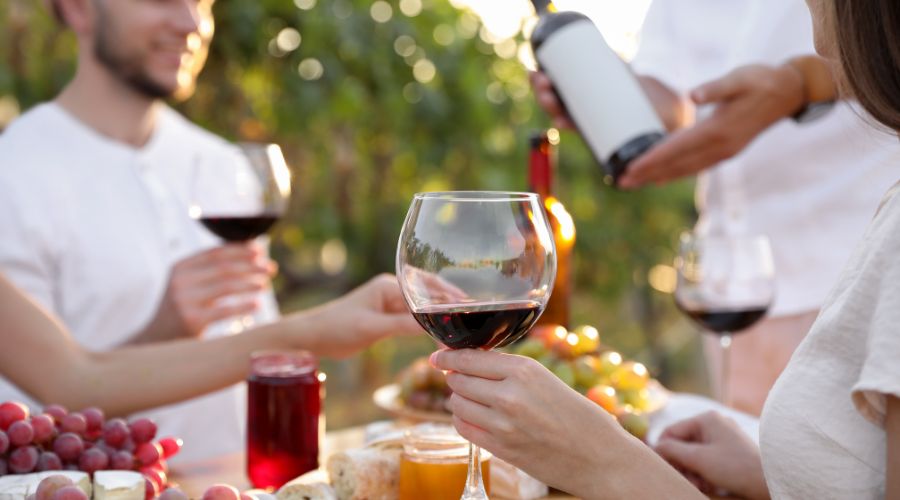Wine sales options: Finding the right fit for your wine estate’s growth
19th August 2025
Winemaker and business strategist Michelle Knight shares her wisdom in the world of wine sales.

As a wine estate owner, the journey to success involves much more than cultivating the perfect grapes and crafting exceptional wines. The real challenge begins when it comes to selling your product. There are a variety of sales channels available, each with its own unique benefits and challenges. With the right strategy, you can create multiple revenue streams that work harmoniously together, expanding your reach and enhancing your business growth.
In this article, we’ll explore some of the most popular wine sales options, examining their potential, as well as the pitfalls to watch out for, giving you a clearer understanding of which options align best with your business and how to make them work for you.
Cellar door sales

For many wineries, cellar door sales are the cornerstone of their business. This direct-to-consumer approach allows visitors to experience your wine firsthand, enjoy a personal connection with the makers, and make purchases in the moment. Cellar door sales offer the chance to tell your story, showcase your wines, create an immersive experience for guests, not to mention offering the highest profit margin of any sales option.
However, while cellar door sales are lucrative, they require more than just a physical space to be successful. You need to create a welcoming environment, knowledgeable staff, and establish a pricing strategy that reflects the experience you offer. And that’s just the beginning. Managing foot traffic, seasonal fluctuations, and ensuring customer satisfaction are ongoing challenges.
Considerations:
Running a cellar door requires significant upfront investment think – about the costs of setting up the venue, staffing, and marketing. Furthermore, the return on investment (ROI) isn’t always immediate, and it can be hard to predict the flow of visitors, especially during off-peak seasons. Without a solid marketing plan, your cellar door could easily go unnoticed in a competitive landscape.
A successful cellar door experience goes beyond having a beautiful space. It requires careful planning, from pricing strategies to staff training and marketing initiatives. A cohesive strategy that aligns with your overall business goals will help you create a memorable customer experience that keeps people coming back, turning casual visitors into loyal wine lovers.
Tours & tastings
Wine tourism is on the rise, and offering guided tours and tastings is one of the best ways to showcase your winery while adding an additional revenue stream. A well-crafted wine tour allows visitors to learn about the winemaking process, explore your vineyards, and, of course, taste your wines.
But, as with cellar door sales, tours and tastings require more than just an enthusiastic guide. They demand thoughtful logistics, including managing tour group sizes, scheduling, and ensuring that visitors have an engaging experience. You’ll also need to handle the marketing of these tours and pricing them to be both appealing and profitable.
Considerations:While tours and tastings can generate additional revenue, the logistics behind them can quickly become a headache. How much should you charge? What should the tour include? How do you market it effectively? Overseeing the coordination of the tours, handling staffing, and ensuring an outstanding experience for every guest can be overwhelming. Without proper planning, your tours could end up feeling disjointed and unpolished, which would negatively impact your brand.
Creating an unforgettable wine tour takes more than just enthusiasm. It requires a comprehensive wine tourism plan aligned to your brand values.
Weddings & events
Weddings, corporate events, and private parties can be lucrative additions to a winery’s revenue stream. A picturesque vineyard or a rustic barn transformed into an event venue creates a unique atmosphere that’s hard to replicate. Many wineries have seen great success hosting weddings and events, drawing in customers who might not otherwise have visited.
However, hosting events comes with a set of challenges. You’ll need to manage venue logistics, such as catering, space preparation, and dealing with event coordination. Additionally, your winery must meet certain legal requirements, such as obtaining licenses, complying with health and safety regulations, and ensuring proper insurance coverage.
Considerations: Events can be a great source of income, but they also require a substantial amount of time, effort, and expertise to execute successfully. Without proper planning, events can quickly spiral into logistical nightmares. It’s not just about having the right space; you need staff who are trained to handle the demands of large gatherings, a catering plan, and a clear marketing strategy to attract bookings.
If you’re considering turning your winery into an event venue, it’s crucial to have a clear plan in place in order to provide exceptional event experiences while minimising the stress of event management.
Online sales
With more consumers shopping online than ever before, having an eCommerce platform for your wines can significantly expand your reach. Online sales provide the opportunity to tap into new markets, whether you’re targeting wine enthusiasts across the country or internationally. Selling directly to customers online not only offers convenience but also can provide you with higher margins than traditional retail sales.
Yet, while the potential is enormous, the complexities of online sales can’t be overlooked. Building a robust online store requires technical expertise, ongoing website maintenance, and an understanding of digital marketing strategies like SEO and paid ads. You’ll need to factor in shipping logistics, customer service, and international regulations if you plan to sell abroad.
Considerations: The online space is crowded, and simply having an eCommerce store isn’t enough to guarantee success. The challenges of building traffic, competing with larger retailers, and handling logistics can be overwhelming. Without a focused strategy, it’s easy to get lost in the noise of digital marketing.
Building a successful online sales strategy isn’t just about having a website – it’s about having the right marketing strategy to drive traffic and convert visitors into loyal customers.
Trade sales
While many wineries focus on direct-to-consumer (DTC) sales, trade sales – selling to distributors, retailers, and restaurants – remain a significant revenue stream. Building strong relationships with trade partners can help your wines reach a wider audience, secure bulk orders, and offer steady income.
However, navigating trade sales can be complex. You’ll need to negotiate pricing, manage orders, and understand the dynamics of the B2B market. Retailers and distributors expect consistent quality and competitive pricing, which can sometimes limit your ability to differentiate your wines.
Considerations: Selling to the trade requires patience and persistence. It often takes time to establish relationships with key trade players, and margins can be smaller than direct-to-consumer sales. Furthermore, selling in bulk can mean relinquishing some control over the customer experience, which can affect brand loyalty.
Trade sales require a nuanced approach and having the right strategy in place – identifying key trade partners, negotiating pricing and ensuring your wines stand out – will make all the difference.
Conclusion: The right mix for success
Evaluating your wine estate’s sales options is an essential step in building a successful business. Whether you’re focusing on cellar door sales, wine tourism, online sales, or trade partnerships, each channel has its unique benefits and challenges. The key to success is not just choosing the right sales channels but integrating them into a cohesive business and marketing strategy.
With the right guidance, you can create a balanced approach that works for your business, ensuring long-term growth and sustainability. If you’re ready to take your winery to the next level, I invite you to join my Vine to Wine programme, where we’ll work together to develop a tailored strategy for your sales options, streamline your operations, and help you build a wine estate that thrives.
About our expert
Michelle Knight is a certified business strategist and qualified winemaker, with over 18 years’ experience helping businesses grow with clarity and purpose. Through her consultancy, English Wine Pro, she works exclusively with UK wine producers to modernise operations, streamline marketing, and increase sales. Her signature programme, Vine to Wine, is designed to help ambitious wine estates build a strong, sustainable business from grape to glass. For more details, click here.
Read more vine news.
